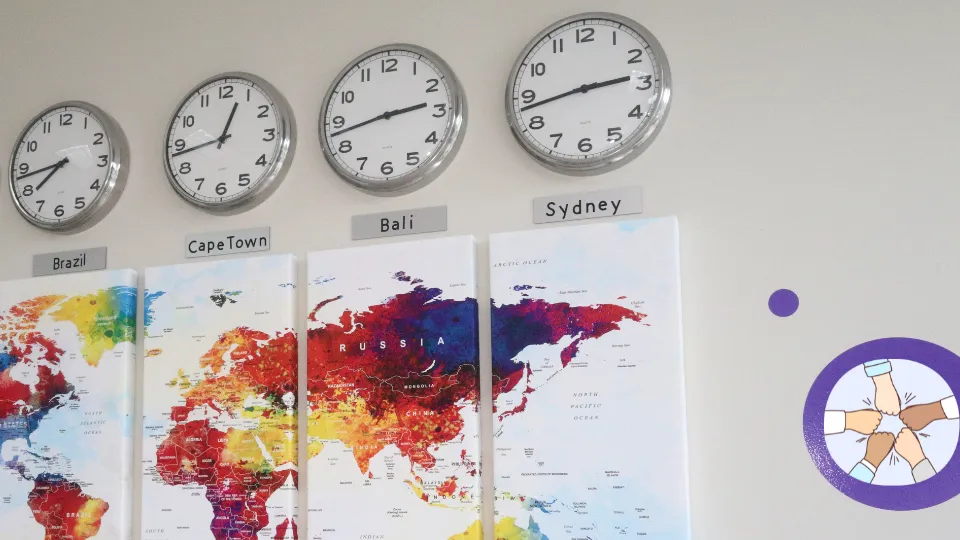Today, working in teams across the temporal regions is the new culture in the world that is going global. This leads to the advantages of being able to access talent from across the globe, while at the same time opening up new considerations. Here are some tips that will help you to manage global teams, how to work with the difference in time zones, and how to increase the productivity of the teams that are in different time zones.
Are you ready to maximize the opportunities your business can create? Let our professionals guide you through implementing regular updates and solid enhancements to your website. Contact us today!
1. Understand Time Zones and Overlapping Hours
Of the key factors to consider when working with time zones, possibly the most significant is the concept of hours of overlap. These are windows when team members across different time zones are available to accomplish a task or carry out an assignment. It is easy to identify these hours by using tools such as WorldTimeBuddy and arrange a meeting or accomplish work that requires focus during such times.
Tips for Managing Time Zones:
- Add a shared time zone map to increase the team’s visibility.
- It is advisable to ensure that the most overlap of hours is covered so that people are on the same page at the same time.
- The ultimate key to timely coordination across different time zones is first to map people’s schedules.
2. Prioritize Asynchronous Communication
Using real-time communication only can be unproductive in international teams. The second area that needs to be managed for global teams is asynchronous communication, which is an important part of your strategy.
Asynchronous Communication Best Practices:
- Therefore, tools like Trello or Asana should be utilized for monitoring the project’s progress.
- In detail share your updates and documents to avoid confusion.
- It minimizes reliance on frantic and localized answers and encourages people to work together regardless of regional differences in time.
3. Use the Right Tools for Collaboration
Global teams’ management doesn’t have to be complicated – use technology designed for remote teams. These tools eliminate the barriers of distance and do not recognize the difference in time zones.
Recommended Tools:
- Communication: Slack or Microsoft Teams.
- Project Management: ClickUp or Monday.com.
- Scheduling: Calendly for scheduling meetings and for automatically setting up the meeting without intervention from the participants.
Picking the right tools helps teams work across time zones optimally while ensuring that working does not seem like a chore.
4. Rotate Meetings and Respect Cultural Differences
When it comes to international teams, there is nothing as important as fairness and inclusion. The flow of the meetings means that no team member is stuck with inconvenient timings consistently.
Team Coordination Tips:
- Change the timing of the meetings frequently to satisfy all participants.
- Consider regional holidays and cultural values whenever there is plan making for the implementation of the project.
- The international team collaboration tips are improved while paying attention to the culture as it fosters trust among the team members.
5. Build a Strong Team Culture
Regardless of the tools or schedules people use, one cannot be close to their colleagues, and this will affect productivity. Education should be aimed at creating a team culture that is unbreakable.
Ideas for Team Bonding:
- Schedule and run virtual coffees or team-building sessions.
- People should come together for birthdays, graduations, or other accomplishments.
- Team culture when combined with remote team tips gives team members the incentive to remain loyal and work cohesively.
6. Performance Tracking and Overcoming Problems
It is unproductive and demoralizing if there is no action taken to curb the challenge faced. It is regarded highly important to establish reconvenes to monitor the performance of the global team to preserve the momentum.
Time Zone Collaboration Tips:
- Monitor the work and time with apps such as Hubstaff or Time Doctor.
- It is/It will also be important/essential/required/instructive/favorable/advantageous of to regularly review team feedback to identify and remove barriers.
- Making work well-being and efficient work a key allows for achieving sustainable success and efficiency across time zones for a team.
See Also: In-House vs. Dedicated Teams: Which is Better for Your Business?
Looking for ways to advance your business? We have experts who will ensure that your website suits your needs as you need it. Get started with us now!
Final Thoughts
Successful virtual management of teams is possible if three factors are taken into consideration; time, precedence, and tools. Therefore possible strategies to address remote team time zone issues include focusing on time overlapping, using asynchronous communication, and building a very good team culture.
In need of assistance on how to make your international team perform better? Call us today and let our experts guide you with time zone collaboration!
FAQs:
Q1: What do managers find most difficult when operating in international and/or virtual teams?
A1: Bringing together geographically dispersed people presents coordinational issues such as transnational time zones and scheduling.
Q2: How can I ensure efficient collaboration across time zones?
A2: Use overlapping hours, asynchronous communication, and scheduling tools for smooth time zone collaboration.
Q3: What tools are best for managing time zones in teams?
A3: Tools like WorldTimeBuddy and Calendly help schedule meetings and manage time zones effectively.
Q4: How do I handle cultural differences in global teams?
A4: Respect holidays, work practices, and communication styles for better international team collaboration tips.
Q5: How can I build trust in remote teams?
A5: Regular team bonding activities, clear communication, and recognition of achievements enhance trust in remote team tips.


_thumb.webp)
_thumb.webp)















